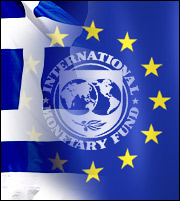By Holly Ellyatt, CNBC
As talks between Greece and its creditors drag on and pressure mounts on both sides to find a deal, relations between Athens and its European partners are getting worse, not better.
Tensions over reforms-for-aid negotiations came to a head Sunday when European Commission President Jean-Claude Juncker accused the Greek Prime Minister Alexis Tsipras of distorting what the creditors had proposed to make some headway in securing a deal for the country.
This was a very different picture from last week. Relations between Juncker and Tsipras appeared to have soured very quickly after what seemed to be an amicable meeting last Wednesday.
Adding insult to injury Tsipras said he was “unpleasantly surprised” by the offer made by Juncker, who – as head of one of the three institutions overseeing Greece’s bailout program, along with the International Monetary Fund (IMF) and European Central Bank (ECB) – had helped to craft the alternative proposals.
Tempers frayed
Speaking at the Group of Seven (G-7) summit in Germany on Sunday, Juncker said he was a “little bit disappointed by the speech.”
“He was presenting the offer of the three institutions (to the Greek parliament) as a ‘take-it-or-leave-it-offer’. That was not the case. That was not the message given to him. He was presenting the offer of the three institutions as being mine and mine exclusively. He knows perfectly well that this is not the case. And he knows perfectly well that I was – during the meeting we had last Wednesday- perfectly ready to discuss on the main points where disagreements are between Greece and the three institutions.”
“As I told you before, I am waiting for an alternative proposal of our Greek counterparts. I do not have a personal problem with Alexis Tsipras, quite the contrary. He was my friend, he is my friend. But friendship – in order to maintain – it has to observe some minimal rules,” Juncker said.
It was also reported that Juncker refused a request from Tsipras to meet him on Saturday, feeling that the speech on Friday left little to discuss, Reuters reported.
Negotiations between Greece and its international creditors over a reforms-for-aid deal are expected to continue this week and, after four months of inconclusive talks, it’s no wonder that tempers are getting frayed.
Greece owes billions of euros worth of debt repayments over the summer and chose last week to bundle its four payments due to the International Monetary Fund (IMF) into one lump payment to be paid at the end of the month.
Whether Athens and its creditors can continue to delay reaching an agreement is a matter for debate, however, with expectations rising that Greece could default on its debt and potentially leave the euro zone altogether.
According to a poll by Swiss asset management group GAM of 78 institutional investors just over a third of those surveyed believe Greece will leave the euro zone before the end of May next year.
More compromises
Greece was one of the hot topics up for discussion at Sunday’s G-7 summit and leaders are aware that far more work needs to be done to reach an agreement.
Germany Chancellor Angela Merkel said she, Juncker and French President Francois Hollande briefed the G-7 leaders on the progress in the Greek debt talks.
“We could not say that the problem was solved,” she told ZDF television, according to a Reuters report, adding there was still a lot of work to do: “we haven’t reached the finishing line yet.”
Craig Erlam, senior market analyst at currency trading firm OANDA, said in a note Monday that there needed to be more compromise from both sides.
“There needs to be some compromise from both sides, albeit probably much more from Greece being the debtor country, otherwise I fear we could be seeing them walking blindly towards disaster.”



















